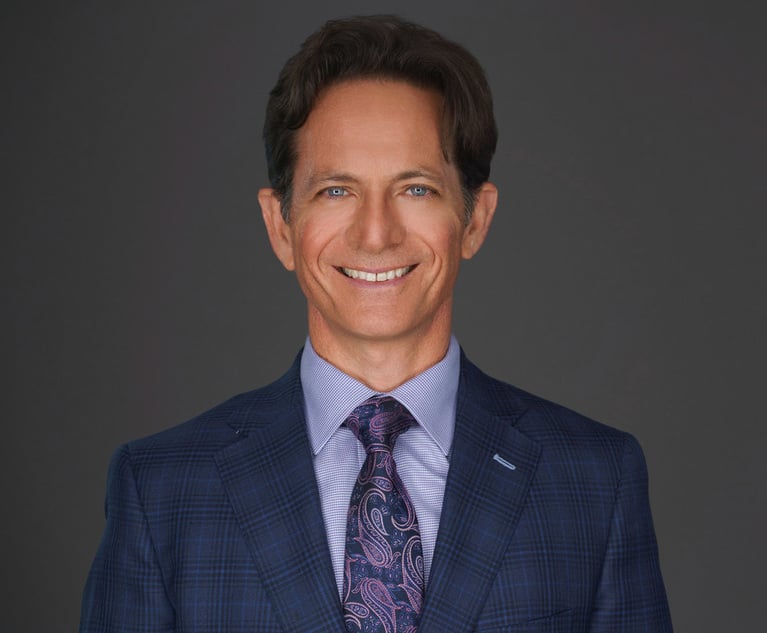Miami Lawyer Steers Plane Manufacturer Away From $15M Lawsuit
Michael Marsh of Akerman in Miami teamed with Nixon Peabody lawyer Joseph Ortego to swerve a Broward jury from finding for the plaintiff in a $15 million negligence lawsuit, arguing that French aircraft manufacturer Daher-Socata was not responsible for a crash that left a doctor brain damaged.
December 17, 2018 at 02:30 PM
7 minute read
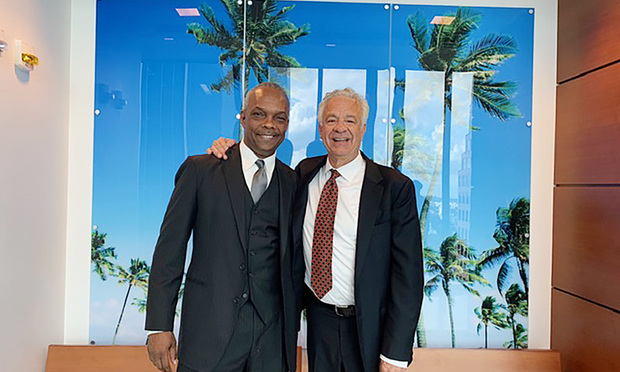 Michael Marsh of Akerman in Miami (left) with Joseph Ortego of Nixon Peabody in New York (right). Courtesy photo.
Michael Marsh of Akerman in Miami (left) with Joseph Ortego of Nixon Peabody in New York (right). Courtesy photo.
Michael Marsh of Akerman in Miami persuaded a Broward jury to clear his client, French airplane maker Daher-Socata and its U.S. branch Socata North America Inc. of a $15 million lawsuit brought by Cynthia McCaleb, who claimed design defects caused a crash that left her brain damaged.
Marsh teamed with New York lawyer Joseph Ortego of Nixon Peabody to prove the accident was down to pilot error, not engineering faults.
As an experienced pilot, McCaleb's husband Blaine McCaleb had access to a TBM 700/850 turboprop aircraft. The plane, built by Daher and marketed for about $4 million, can fly up to 32,000 feet and scale the Atlantic ocean with just one propeller and a single-jet engine.
But when the McCalebs steered it off a runway on Oct. 5, 2014, they almost never made it back.
“The airplane suffered an in-flight, catastrophic loss of engine power, necessitating an emergency landing,” said McCaleb's 2015 complaint, blaming Daher's alleged dangerous and defective fuel system for the crash.
Both survived, but with serious and lasting injuries. Cynthia McCaleb, a medical doctor before the crash, claimed she suffered career-ending brain injuries and sought $15 million in damages. Blaine McCaleb suffered back and neck injuries, and filed a separate lawsuit which was later consolidated with his wife's.
According to the complaint, Daher should have designed a better fuel system and warned customers about the dangers of flying its planes.
Plaintiffs lawyers David Katzman, Bradley Stoll and Bruce Lampert of Katzman, Lampert & Stoll Aviation Law in New York did not respond to requests for comment before deadline.
Click here to read the full complaint
The lawsuit put Marsh and his team in a difficult spot.
Daher — the oldest aircraft manufacturer still in operation, according to its website — only makes one type of aircraft and has done so for more than a century.
“Since it's an active product and it's being manufactured today and purchased today, the client was very concerned about the brand and the reputation of the aircraft,” Marsh said. “They did not want to settle this case. They wanted to defend the aircraft.”
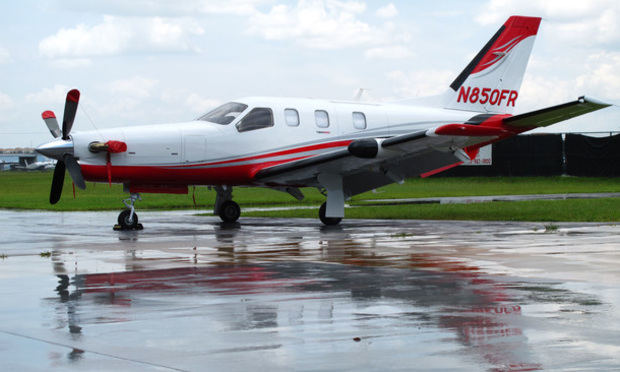 Daher-Socata aircraft. Courtesy photo.
Daher-Socata aircraft. Courtesy photo.But going to trial was a dangerous move, according to Marsh and Ortego, as a loss would have severely damaged the company's reputation and threatened its employees' jobs.
“The delicate balance for our client was, do you settle this case for some number or do you try it? And what does settlement mean? Does settlement mean that there was something wrong with our aircraft? That would have the same impact as having an adverse verdict,” Marsh said.
Daher opted to defend its product, trusting that a Broward County jury would hear the case fairly.
“We are believers in the aircraft, our clients believe in the quality of its product, the CEO and his family fly the product and a lot of folks in the company fly the product,” Marsh said. “So we took a deep breath and tried the case.”
The biggest obstacle, according to Marsh, was McCaleb's injuries, as he worried a jury might put compassion above evidence.
“We could defend the aircraft and the mechanics of the aircraft, but they definitely had a sympathetic pain and suffering case,” Marsh said.
Rather than claiming Daher's aircraft was perfect, Marsh and Ortego explained that no one can build an accident-proof plane, but their client did the best it could.
“We never really tried to exaggerate our position,” Ortego said.
Trying hard to hold onto the jury, the defense openly acknowledged the horror of the plane crash and resulting injuries. Instead of attacking the plaintiffs' pain and suffering case head on, Marsh and Ortego took an indirect approach.
“We discredited the pain and suffering case through different witnesses and not the plaintiff,” Marsh said. “So we kind of diffused the emotional components of it that way.”
Marsh and Ortego questioned McCaleb's family, friends and former doctors, who revealed she had prior medical conditions before the accident. When it came time to cross-examine McCaleb, they spent no more than 15 minutes.
“The expectation was that we would go through all (McCaleb's) prior medical history and hit her hard on whether or not the plane crash really caused the issues, but it was never done to her,” Marsh said.
Another crucial decision came at the end of the trial, when Marsh and Ortego opted not to put any doctors on the stand.
“Some would say that's a risky call,” Marsh said. “But what we were concerned about was, one, ending our case on that note, and two, the plaintiffs lawyers using that as an opportunity to relitigate the pain and suffering case through our experts.”
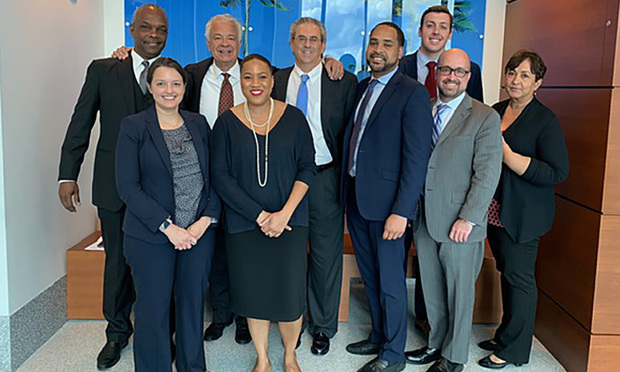 Daher-Socata's trial team. Courtesy photo.
Daher-Socata's trial team. Courtesy photo.It also didn't hurt that Daher was willing and able to invest heavily in its defense. According to Marsh, the company spared no expense in retaining who it felt were the best and brightest in their fields.
The plaintiff called various flight experts and scientists specializing in metals, who testified that the material used for the plane wasn't strong enough to withstand the impact of the crash. But Daher's experts countered, arguing that if a plane impacts the ground at 100 miles per hour and the passengers survive, that's testimony to the quality of the aircraft.
The defense wrapped up with an animated simulation of the flight, allowing the jury to witness the moments leading up to the crash and see how the accident played out. According to Marsh and Ortego, those simulations proved that McCaleb's husband had ample opportunity to glide to a nearby airport and avoid a crash.
“The simulation showed the warnings that occurred in the cockpit, the visual instruments that (McCaleb) should have been reading to show that the plane was flying in a crooked or uncoordinated fashion,” Marsh said. “All of that he missed.”
Marsh and Ortego remained nimble, making last-minute decisions during the trial. Each night, they'd sit down to decide who would cross-examine witnesses the following day. And when the jury asked questions they paid close attention, making adjustments to their case based on what they'd asked.
The jury ultimately found that Daher bore no responsibility for McCaleb's injuries.
McCaleb has filed a motion for new trial, arguing that important evidence was excluded from trial. Depending on the outcome, McCaleb may decide to appeal the verdict.
Read the full jury verdict:
Case: Cynthia McCaleb v. Daher-Socata
Case No.: 2015-014561 (02)
Description: Negligence
Filing date: Aug. 14, 2015
Verdict date: Nov. 16, 2018
Judge: Broward Circuit Judge Patti Englander Henning
Plaintiffs attorneys: David Katzman, Bradley Stoll and Bruce Lampert, Katzman, Lampert & Stoll, New York
Defense attorneys: Michael Marsh, Akerman, Miami; Joseph Ortego, Nixon Peabody, New York
Verdict: For the defense
This content has been archived. It is available through our partners, LexisNexis® and Bloomberg Law.
To view this content, please continue to their sites.
Not a Lexis Subscriber?
Subscribe Now
Not a Bloomberg Law Subscriber?
Subscribe Now
NOT FOR REPRINT
© 2025 ALM Global, LLC, All Rights Reserved. Request academic re-use from www.copyright.com. All other uses, submit a request to [email protected]. For more information visit Asset & Logo Licensing.
You Might Like
View All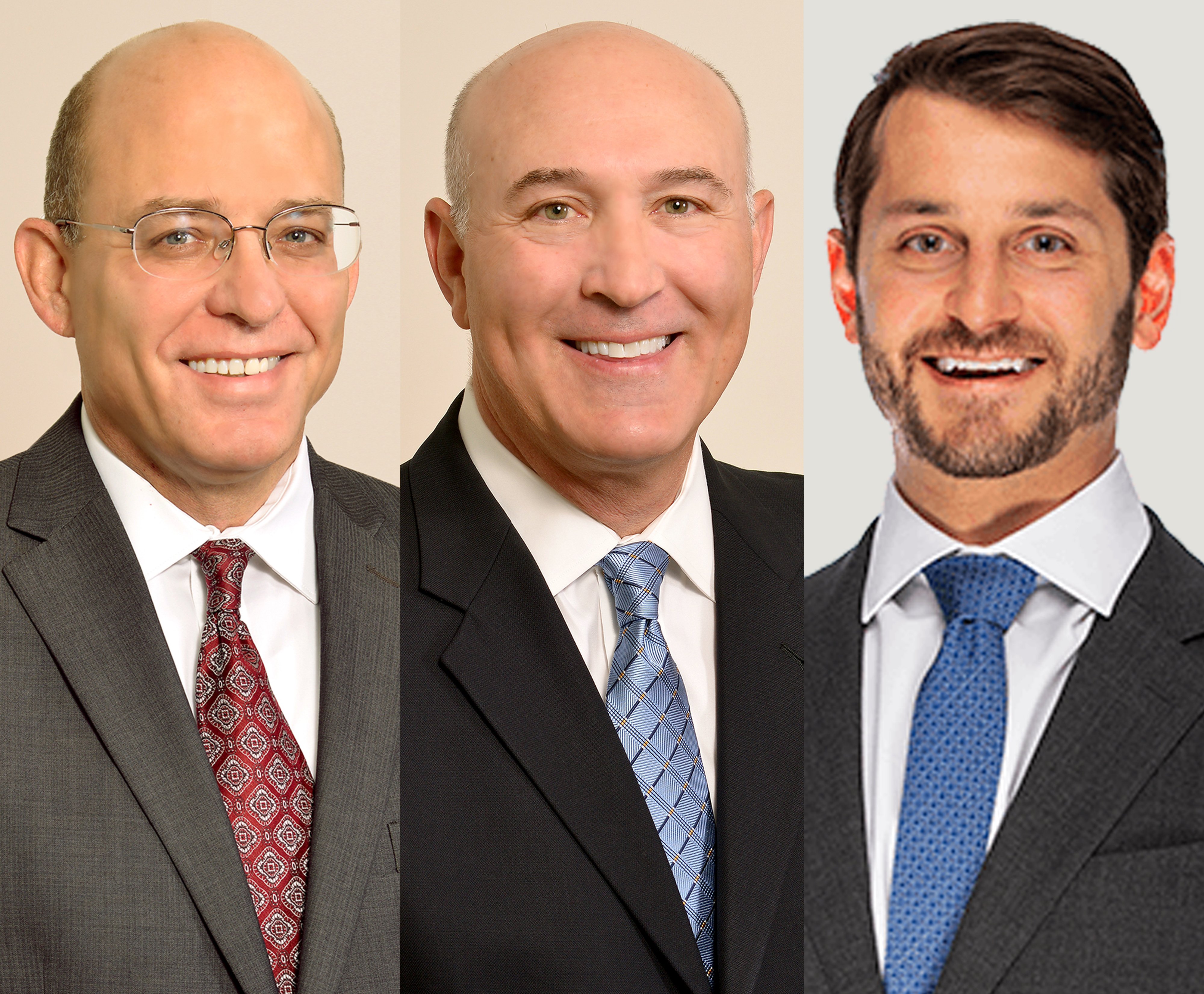
Million-Dollar Verdict: Miami Jury Sides With Small Business
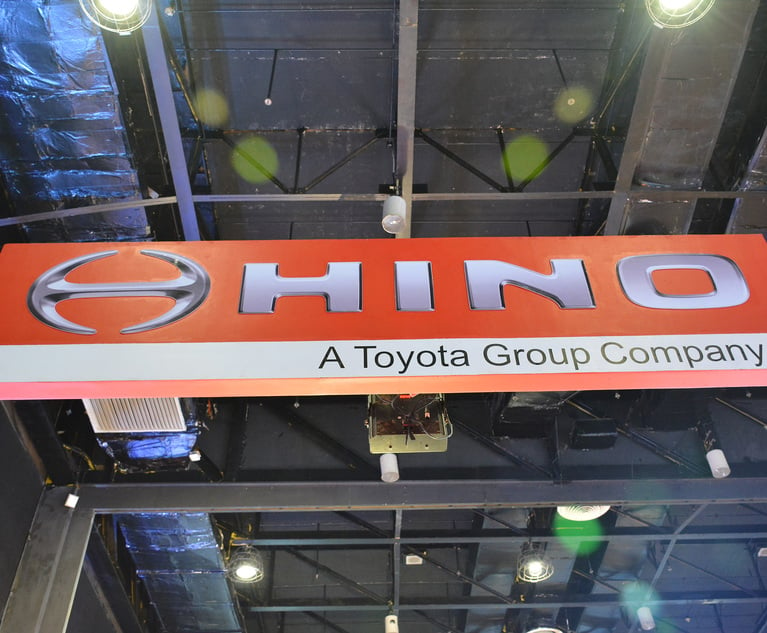
Automaker Pleads Guilty and Agrees to $1.6 Billion in Payouts
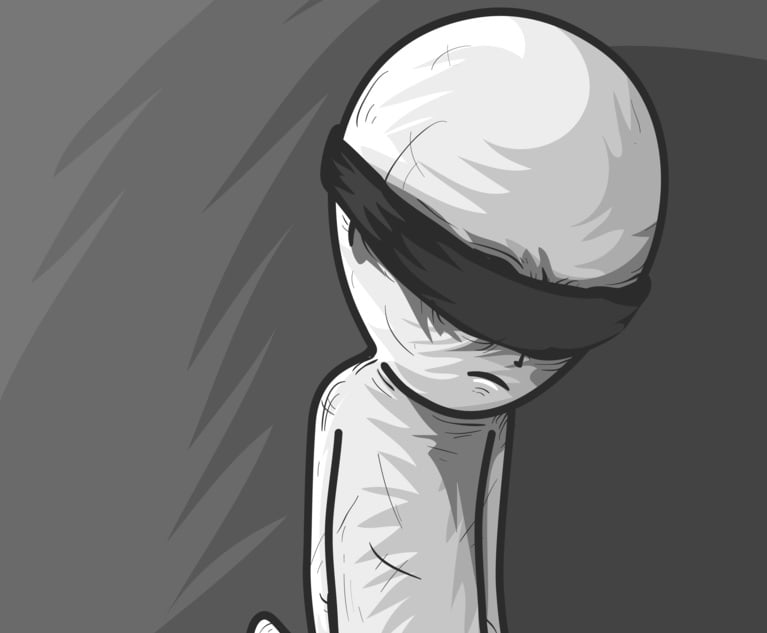
'I've Seen Terrible Things': Lawyer Predicts Spike in Hazing Suits
Trending Stories
- 1'Lookback Window' Law for Child Abuse Cases Constitutional, State High Court Finds
- 2Troutman Pepper Says Ex-Associate Who Alleged Racial Discrimination Lost Job Because of Failure to Improve
- 3Texas Bankruptcy Judge Withdraws Ethics Complaint Against Jackson Walker
- 4Apply Now: Superior Court Judge Sought for Mountain Judicial Circuit Bench
- 5Harrisburg Jury Hands Up $1.5M Verdict to Teen Struck by Underinsured Driver
Who Got The Work
J. Brugh Lower of Gibbons has entered an appearance for industrial equipment supplier Devco Corporation in a pending trademark infringement lawsuit. The suit, accusing the defendant of selling knock-off Graco products, was filed Dec. 18 in New Jersey District Court by Rivkin Radler on behalf of Graco Inc. and Graco Minnesota. The case, assigned to U.S. District Judge Zahid N. Quraishi, is 3:24-cv-11294, Graco Inc. et al v. Devco Corporation.
Who Got The Work
Rebecca Maller-Stein and Kent A. Yalowitz of Arnold & Porter Kaye Scholer have entered their appearances for Hanaco Venture Capital and its executives, Lior Prosor and David Frankel, in a pending securities lawsuit. The action, filed on Dec. 24 in New York Southern District Court by Zell, Aron & Co. on behalf of Goldeneye Advisors, accuses the defendants of negligently and fraudulently managing the plaintiff's $1 million investment. The case, assigned to U.S. District Judge Vernon S. Broderick, is 1:24-cv-09918, Goldeneye Advisors, LLC v. Hanaco Venture Capital, Ltd. et al.
Who Got The Work
Attorneys from A&O Shearman has stepped in as defense counsel for Toronto-Dominion Bank and other defendants in a pending securities class action. The suit, filed Dec. 11 in New York Southern District Court by Bleichmar Fonti & Auld, accuses the defendants of concealing the bank's 'pervasive' deficiencies in regards to its compliance with the Bank Secrecy Act and the quality of its anti-money laundering controls. The case, assigned to U.S. District Judge Arun Subramanian, is 1:24-cv-09445, Gonzalez v. The Toronto-Dominion Bank et al.
Who Got The Work
Crown Castle International, a Pennsylvania company providing shared communications infrastructure, has turned to Luke D. Wolf of Gordon Rees Scully Mansukhani to fend off a pending breach-of-contract lawsuit. The court action, filed Nov. 25 in Michigan Eastern District Court by Hooper Hathaway PC on behalf of The Town Residences LLC, accuses Crown Castle of failing to transfer approximately $30,000 in utility payments from T-Mobile in breach of a roof-top lease and assignment agreement. The case, assigned to U.S. District Judge Susan K. Declercq, is 2:24-cv-13131, The Town Residences LLC v. T-Mobile US, Inc. et al.
Who Got The Work
Wilfred P. Coronato and Daniel M. Schwartz of McCarter & English have stepped in as defense counsel to Electrolux Home Products Inc. in a pending product liability lawsuit. The court action, filed Nov. 26 in New York Eastern District Court by Poulos Lopiccolo PC and Nagel Rice LLP on behalf of David Stern, alleges that the defendant's refrigerators’ drawers and shelving repeatedly break and fall apart within months after purchase. The case, assigned to U.S. District Judge Joan M. Azrack, is 2:24-cv-08204, Stern v. Electrolux Home Products, Inc.
Featured Firms
Law Offices of Gary Martin Hays & Associates, P.C.
(470) 294-1674
Law Offices of Mark E. Salomone
(857) 444-6468
Smith & Hassler
(713) 739-1250





